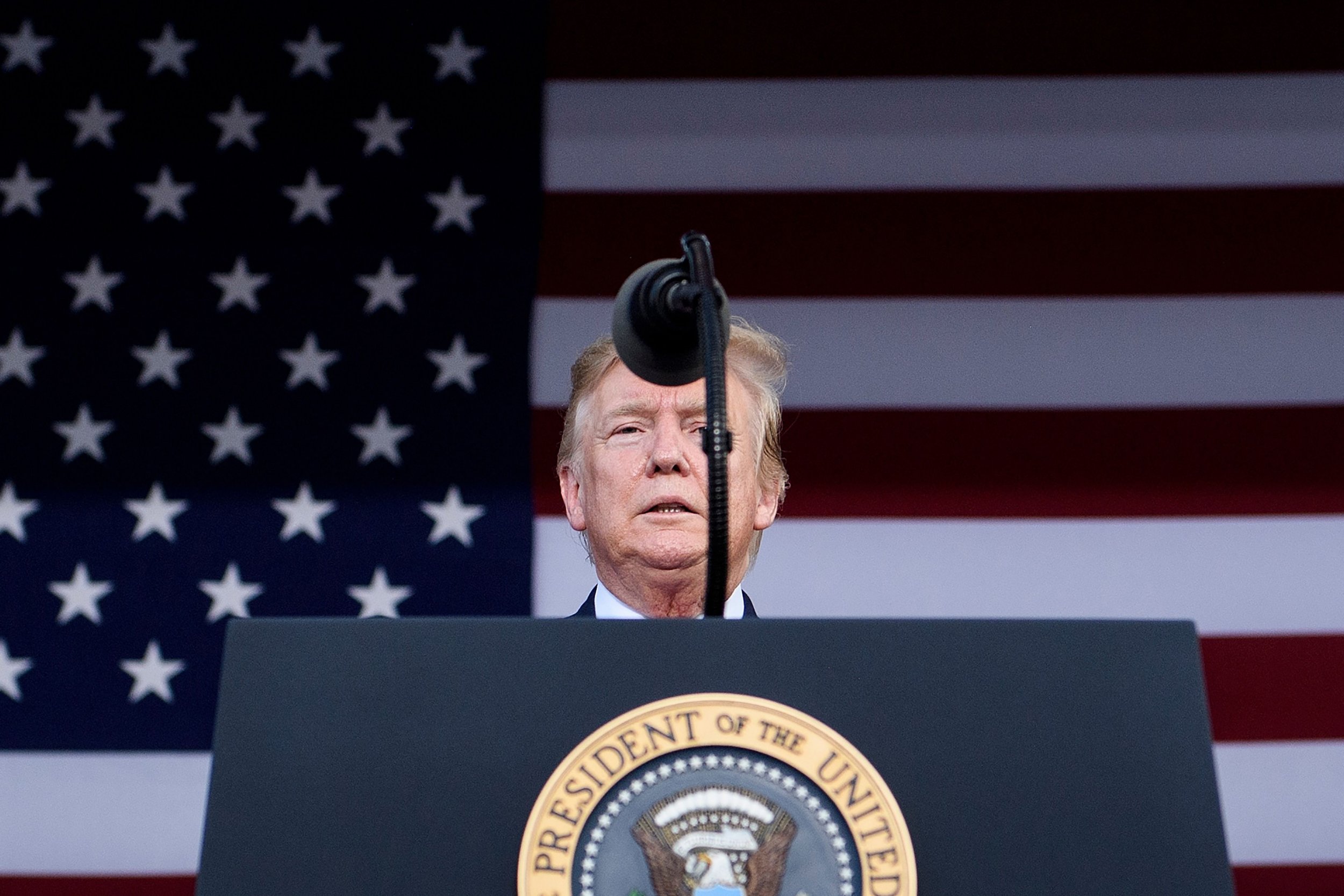
President Donald Trump has struggled to come up with a foreign policy win and has instead allowed hawkish voices within his administration to further escalate global tensions as ambitious diplomatic initiatives failed, experts say.
At a time when Trump was defending his Art of the Deal persona from a damning New York Times report showing the celebrity businessman-turned-politician lost up to $1 billion during his 1980s to 1990s heyday as a real estate titan, the Republican leader was also facing diplomatic troubles, as promises to reshape the U.S. relationship with Iran, North Korea and China collapsed.
On both the campaign trail and since taking office, the self-styled dealmaker vowed to deliver big results with regard to each of these three nations, leading to high hopes among a significant chunk of his constituency.
Trump pledged to deliver a better nuclear deal with Tehran than the historic one struck by his predecessor, achieve an unprecedented peace based on denuclearization with Pyongyang and hammer out a more just trade policy with Beijing. In the past week alone, however, these powers only hardened their positions and the current state of affairs bore little resemblance to the vision the Trump administration has sought.
"I think as President Trump's tax returns are showing, he is not the deal-maker he has portrayed himself to be," Tom Collina, policy director of the Ploughshares Fund think tank, told Newsweek.
"We are now seeing that play out with China, North Korea and Iran," he added. "Trump is calling on China to join New START nuclear arms control talks, but Beijing is not interested. Trump wants a deal with North Korea but does not understand how to get it done. And now Trump is in danger of starting a war in the Middle East with Iran, which he has said he does not want."
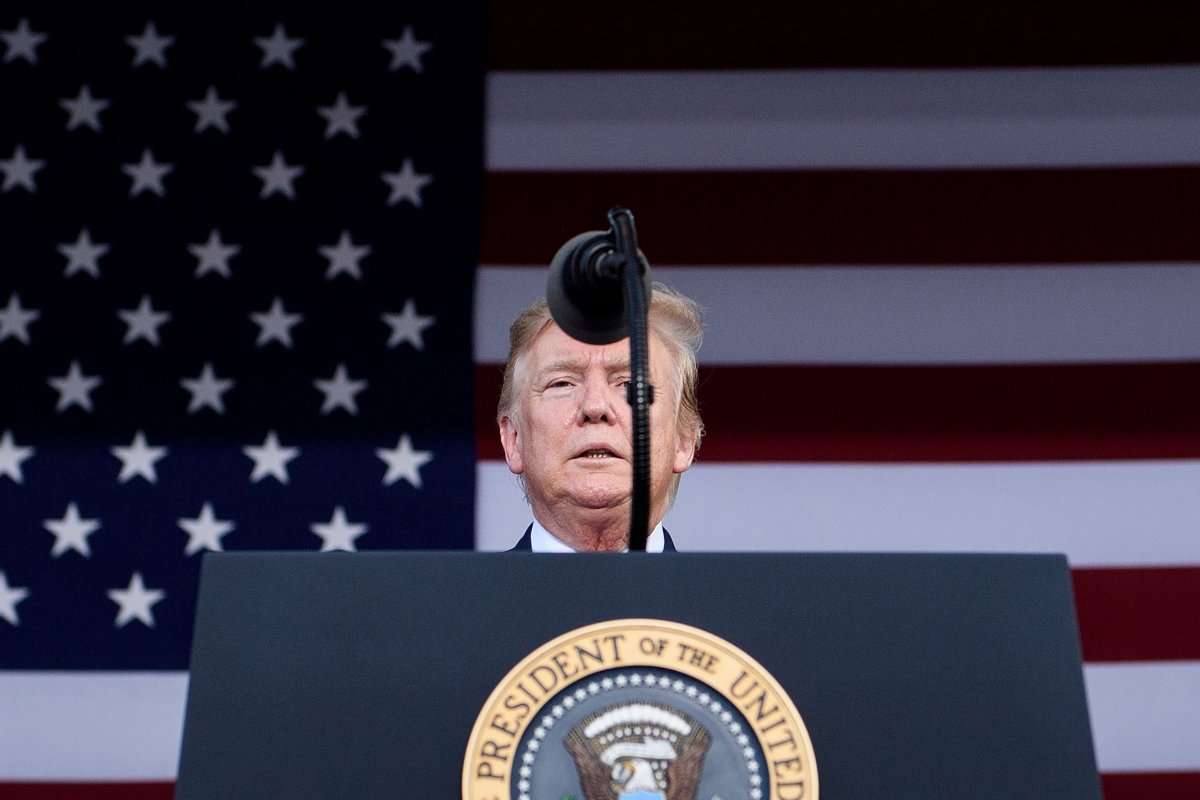
Trump was long critical of the landmark nuclear deal negotiated by President Barack Obama and signed in 2015 by the U.S., Iran, China, the EU, France, Germany and the United Kingdom. The deal offered Iran billions of dollars in sanctions relief in exchange for it agreeing to curb its nuclear production, but conservatives in both Washington and Tehran viewed the arrangement with deep skepticism.
Once in the White House, Trump quickly began threatening to renegotiate or scrap what he routinely called "one of the worst deals" ever made—a term he's also used in describing other international arrangements such as the North American Free Trade Agreement and the World Trade Organization. He accused Iran of using unfrozen assets to fund militant groups and support ballistic missile activity and when it became clear that the deal's other signatories had no interest in going back to the negotiating table, the White House unilaterally withdrew one year ago.
It may be no coincidence that one month before the May 2018 exit, Trump appointed a new national security adviser—John Bolton, an outspoken opponent of international diplomacy and a man who played an integral role in advocating for the "endless" wars that Trump promised to cease. The longtime Washington insider has since helped to shape a militant U.S. foreign policy against Tehran, joining Secretary of State Mike Pompeo in rolling out crippling sanctions designed to reduce Iran's oil exports to zero.
Bolton announced on Sunday the early deployment of a Navy carrier strike group and bomber task force to the Persian Gulf and Pompeo took a surprise trip Tuesday to Iraq amid alleged reports of an Iranian plot to attack U.S. interests in the region. On Wednesday, the anniversary of the U.S. departure from the nuclear deal, Iran's Supreme National Security Council announced the country would end "some" of its commitments to the 2015 agreement as the European parties to the deal struggled to uphold in the face of U.S. restrictions.
"Trump is being misled on all these fronts by national security advisor John Bolton," Collina told Newsweek. "Bolton wants war and conflict in all these areas, while Trump says he does not. But it appears that Bolton has so far been able to outmaneuver Trump. It is past time for Trump to fire Bolton if he does not want to get dragged into wars of choice around the globe."
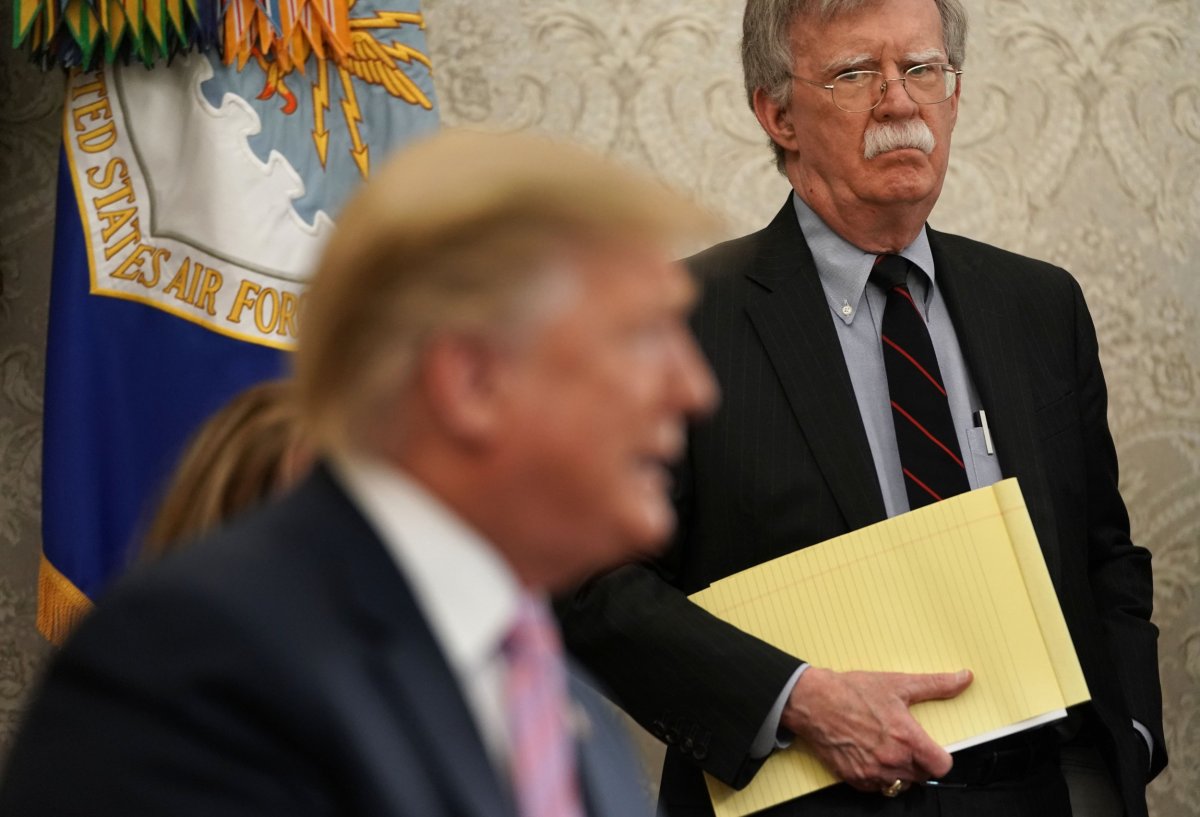
The White House has also referred to its strategy toward North Korea as "maximum pressure," but after tensions peaked with supreme leader Kim Jong Un throughout Trump's first year in office, last year saw the president begin exploring a nuclear deal of his own. In a near reversal of his approach to Iran, Trump reached out to Kim and the two held the first-ever bilateral summit between their countries last June in Singapore.
The meeting was accompanied by promising developments such as the U.S. scaling down and suspending joint exercises with South Korea and Kim suspending longer-range missile tests, freeing U.S. prisoners, beginning to dismantle military sites and returning the bodies of some U.S. troops killed in the Korean War during the 1950s.
By the time the second Trump-Kim summit — this time in the Vietnamese capital of Hanoi — arrived in February, however, diplomacy had at least publicly slowed.
Still, many experts were hopeful of a potential deal between the two leaders, who continued to praise one another. Instead, Trump walked out early and the North Korean delegation blamed Bolton, who joined the talks at the final stretch and reportedly pushed for stricter measures against Pyongyang's weapons of mass destruction program, apparently derailing the conversation.
In the months since their Hanoi meeting, an even more hopeful inter-Korean peace process has begun to stall, Washington and Pyongyang have halted their program to facilitate the return of fallen troops and North Korea has tested two short-range missiles that, while not comparable to the intercontinental ballistic missile tests of 2017, have again raised regional fears of a return to the point of crisis.
"Trump's own negotiation tactics are failing him and making us all less safe. Everywhere you look, he comes off as desperate and scattered, not strong and confident," Erica Fein, advocacy director at the Win Without War think tank, told Newsweek. "Trying to 'go big' in Hanoi resulted in no deal, even though there were specific tangible commitments that North Korea offered that would have left the United States better off."
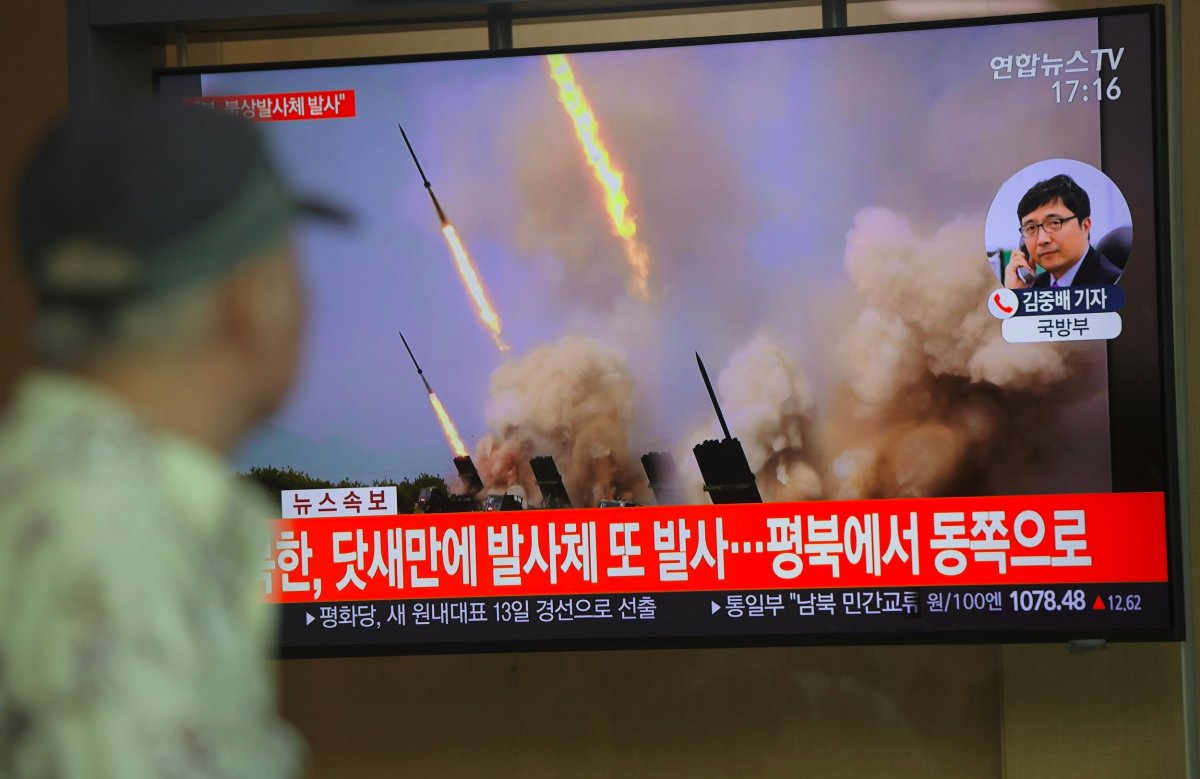
Prior to Trump's fragile detente with Kim, one way in which the White House sought to get to North Korea was through its top ally, China. Getting "tough" on Beijing was one of Trump's earliest campaign promises, one directed specifically at working class Americans, whom he argued were losing out due to a massive trade deficit between the world's top two economies, but he attempted to leverage a relationship with Chinese President Xi Jinping to put pressure on Kim.
While Trump's relationship with Kim ultimately improved, the White House's ties to Xi ultimately began to sour. Economic woes once again divided the two and Trump's solution was to impose tariffs last year that sparked a trade war, angering not only Beijing but also allies of Washington around the world.
This economic conflict has cost the U.S. and China billions of dollars each, but the rivals have repeatedly come back to the table, seeking to smooth over their financial frictions.
Yet, as Bolton announced the Navy was heading toward the Persian Gulf as a warning to Iran, Trump unleashed a new social media salvo against China, threatening on Twitter to raise tariffs again as Beijing took the defensive and the stock market took a hit.
Fein warned that Trump's "clumsy attempt to play hardball with China on trade is just making him look weak, hurting the American economy, and making it harder for the United States to operate on the global stage."
Coupled with his other shortcomings, she added that "he has already done tremendous damage to America's reputation and we'll be lucky to escape a new war before he leaves office."
Ploughshares Fund executive director Philip Yun said it was still "too early in the political cycle" for some of these deals to be finalized, but likened the president's foreign policy approach to his background in business and television. It wasn't "the art of the deal," however, it was the art of the "cliffhanger"—the same suspense Trump reportedly used decades ago during his stint as a corporate raider, feigning interest in taking over a company by purchasing shares and then cashing in on the speculation.
"The whole danger of this is a miscalculation and that is my biggest fear," Yun told Newsweek. "I've been worried about this in regards to North Korea, in regards to Iran and in respect to a different sort of miscalculation, in regards to China."
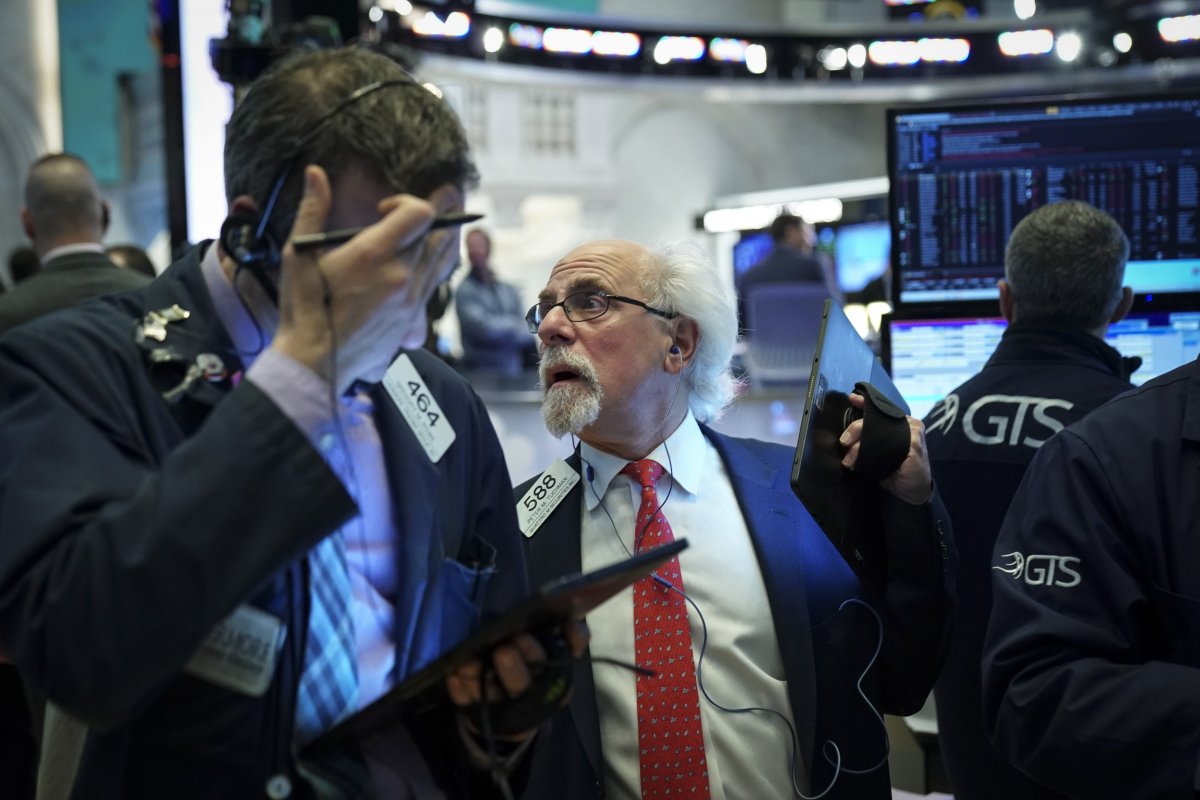
With a re-election campaign coming up, Trump faced the daunting task of squeezing political points from these overlapping diplomatic deadlocks. Harry Kazianis, director of Korean Studies at the Center for the National Interest, told Newsweek that "the challenge for Trump is he has moved away from the foreign policy platform he promised the American people—and it could be his undoing.
"During the campaign, Trump declared he would focus on only areas where America's long-term interests were clearly threatened. Instead, Trump's foreign policy is more 'art of the bluff' than 'art of the deal,' meaning that he projects a posture of strength on issues like Iran, Venezuela, Cuba and other parts of the world but it never amounts to anything more than tough rhetoric," Kazianis told Newsweek. "And while I am glad his bluffs have not turned into military action, it will eventually make America look weak, as if we are all rhetoric and no action. And that would be a mistake.
"Trump would be much better served by adopting policies he hinted at during the campaign—winding down commitments in the Middle East and avoiding costly regime change wars that have cost America trillions of dollars, focusing on the great power challenge from China and tackling the North Korea nuclear threat," he added. "He also needs to bring in advisers who match that world view—as clearly hawks like John Bolton will never embrace such goals, and will do all they can to change Trump's mind."
Uncommon Knowledge
Newsweek is committed to challenging conventional wisdom and finding connections in the search for common ground.
Newsweek is committed to challenging conventional wisdom and finding connections in the search for common ground.
About the writer
Based in his hometown of Staten Island, New York City, Tom O'Connor is an award-winning Senior Writer of Foreign Policy ... Read more
To read how Newsweek uses AI as a newsroom tool, Click here.








